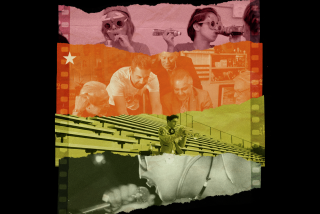TV Documentary Planned on Chicano Movement
- Share via
Initial work has begun on a public broadcasting documentary series about the Chicano movement of the 1960s and ‘70s at the National Latino Communications Center, a Los Angeles-based organization devoted to making public television programs with Latino themes.
Producers from the center, based at local public television station KCET, received a $70,000 grant for the series in March from the Rockefeller Foundation.
With this initial funding, producer Luis Torres said he has started researching the documentary. Torres said he contacted academic experts in areas ranging from art history to sociology to be on a steering team. Many of the experts will be interviewed for the programs.
But Torres stressed that the scholars will not dominate the show.
“We will focus on the stories of individuals, not just a bunch of so-called experts,” he said. “We’re looking for personal stories to illuminate the big picture of what was going on during the Chicano civil rights movement.”
For example, to lend personal drama to the issue of farm workers rights, Torres will include the story of Emma Tenayuca, the organizer of the pecan shellers strike in San Antonio, Tex.
Another issue in the series will be the walkouts in East L. A. high schools in the late ‘60s. Torres said he will interview people who participated in the walkouts, including those who now teach in Los Angeles high schools.
Torres and Jose Luis Ruiz, NLCC executive director, say the series will be geared to two groups. One is the new generation of Latinos who don’t know the history of the Chicano movement. The other is “the general mainstream audience who don’t know much about us,” Torres said.
Now titled “El Grito de Aztlan: History of the Chicano,” the program was inspired by another PBS documentary series, “Eyes on the Prize,” which focused on the black civil rights movement.
Costs for the project are estimated at $2 million, and Torres said the communications center is still looking for underwriters. He expects the documentary to air in 1993.
More to Read
The complete guide to home viewing
Get Screen Gab for everything about the TV shows and streaming movies everyone’s talking about.
You may occasionally receive promotional content from the Los Angeles Times.






